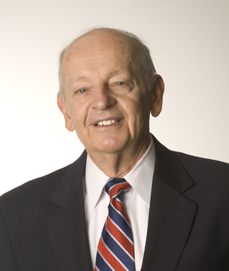The George H. Heilmeier Faculty Award for Excellence in Research
The George H. Heilmeier Faculty Award for Excellence in Research was established by Penn Engineering for the purpose of recognizing excellence in scholarly activities of the faculty. Named in honor of George H. Heilmeier, it recognizes his extraordinary research career, his leadership in technical innovation and public service, and his loyal and steadfast support of Penn Engineering.
2023-2024 Heilmeier Award and Lecture
 Arjun Raj
Arjun Raj
Professor
Bioengineering and Genetics
Monday, April 8, 2024
3:30-4:30 p.m.
Wu and Chen Auditorium, Levine Hall
3300 Walnut Street
Reception to follow in Levine Lobby
This lecture has been recorded and is available for viewing here.
Learn more about, this award, Dr. Raj and his research here.
Past Recipients
2022-23: Dani Smith Bassett – For “groundbreaking contributions to modeling and control of brain networks in the contexts of learning, disease and aging.” (a recording of this lecture can be viewed here.)
2021-22: Ritesh Agarwal – For “groundbreaking contributions to materials for applications in integrated photonics and electronics” (a recording of this lecture can be viewed here).
2020-21: not awarded due to the COVID-19 pandemic
2019-20: Dan Roth – For “pioneering work using natural language text to extract facts, narratives and translations” (a recording of this lecture can be viewed here).
2018-19: Vivek B. Shenoy – For “pioneering multiscale models of nanomaterials and biological symptoms”
2017-18: Jason A. Burdick – For “pioneering developments in polymers for applications in stem cell biology and regenerative medicine.”
2016-17: Daniel Koditschek – For “pioneering contributions in robot motion planning and legged locomotion.”
2015-16: Shu Yang– For “pioneering the synthesis and fabrication of responsive nano- and micro-structured soft materials.”
2014-15: George Pappas– For “fundamental contributions to embedded, hybrid and networked control systems.”
2013-14: John M. Vohs – For “major impact in the fields of surface science and catalysis, especially the surface science of metal oxides.”
2012-13: Vijay Kumar – For “pioneering contributions to the science and technology of cooperative robotics.”
2011-12: Karen I. Winey – For “innovative methods in the fabrication and processing of polymer-based nanotube composites.”
2010-11: Christopher S. Chen – For “fundamental contributions in the study and design of cellular microenvironments.”
2009-10: Rajeev Alur – For “fundamental contributions in software verification for real-time systems.”
2008-09: Scott Diamond – For “discoveries and innovations in high throughput screening and micro-array technology.”
2007-08: Nader Engheta – For “research contributions on nano-optics and related metamaterials.”
2006-07: Pedro Ponte-Castañeda – For “homogenization theory for estimating effective mechanical behavior of nonlinear, heterogeneous materials.”
2005-06: Dawn A. Bonnell – For “significant contributions in Nanolithography and nanostructure assembly.”
2004-05: Michael Kearns – For “significant contributions in new algorithmic ideas in game theory and machine learning.”
2003-04: Dennis E. Discher and Daniel A. Hammer – For “research contributions in the discovery and characterization of polymersomes.”
2002-03: David E. Luzzi – For “research in carbon nanotubes and ‘peapods’.”
2001-02: Raymond J. Gorte – For “research discoveries in solid oxide fuel cells.”
George H. Heilmeier (EE’58)
 Dr. George H. Heilmeier was Chairman Emeritus of Telcordia Technologies, formerly Bellcore, a leading provider of communications software and professional services. Prior to his retirement in November 1997, he was Chairman and Chief Executive Officer. He also served as Senior Vice President and Chief Technical Officer of Texas Instruments, Inc., Director of DARPA and Head of Solid State Device Research at RCA. Dr. Heilmeier received international recognition for his discovery of several new electro-optic effects in liquid crystals leading to the development of the first liquid crystal displays for watches, calculators, and instrumentation, and he held 15 patents.
Dr. George H. Heilmeier was Chairman Emeritus of Telcordia Technologies, formerly Bellcore, a leading provider of communications software and professional services. Prior to his retirement in November 1997, he was Chairman and Chief Executive Officer. He also served as Senior Vice President and Chief Technical Officer of Texas Instruments, Inc., Director of DARPA and Head of Solid State Device Research at RCA. Dr. Heilmeier received international recognition for his discovery of several new electro-optic effects in liquid crystals leading to the development of the first liquid crystal displays for watches, calculators, and instrumentation, and he held 15 patents.
Dr. Heilmeier received his B.S. in Electrical Engineering from the University of Pennsylvania in 1958 and M.A., M.S.E., and Ph.D. degrees in solid-state electronics from Princeton University. He is known for his operational, technical and strategic leadership in transforming new technologies into market driven successes. Throughout his distinguished career, Dr. Heilmeier received numerous awards, including the Department of Defense Distinguished Civilian Service Medal, the Institute of Electrical and Electronics Engineers (IEEE) Founders Medal, the National Academy of Engineering’s highest honor the Founders Award, the Japan Prize in Computers and Communications, the Industrial Research Institute Medal, and the National Medal of Science, among others. In 2002, he received the Pioneer of Stealth Award for “Visionary Leadership and Trailblazing Contributions of Enduring National Significance in the Development of Low Observable Aircraft.”
Dr. Heilmeier served as a White House Fellow, and was a Life Fellow of the IEEE and the American Academy of Arts and Sciences. He was a member of the Defense Science Board, and the National Security Agency Advisory Board. He served on the Boards of Directors of TRW, the MITRE Corporation, INET Technologies Inc., Teletech Holdings, and Automatic Data Processing (ADP) Corporation. He was also a member of the National Academy of Engineering and Chairman of the General Motors Technology Advisory Board. Dr. Heilmeier’s leadership in telecommunications and technology management was also recognized through honorary doctorate degrees from Stevens Institute and the Israeli Institute of Technology (the Technion).
Dr. Heilmeier passed away on April 22, 2014.
